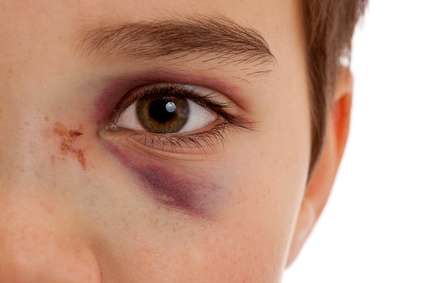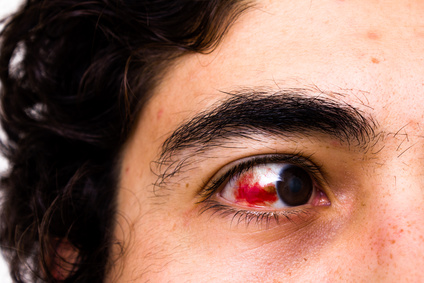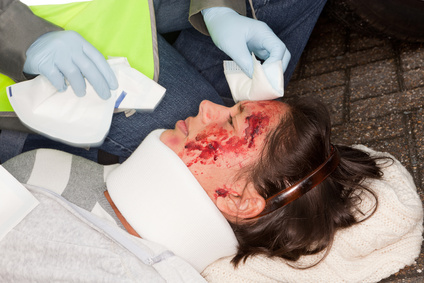Black Eye: is caused by broken blood vessels (or, bleeding beneath the skin) around the eye. Hyphema is when there is bleeding inside the eye (blood in the front chamber of the eye or the cornea).
Treatment: make sure to apply a cold pack or ice pack to reduce the swelling of the patient's injured eye. If blood is visible, in the eye, seek medical attention at the nearest hospital. If the patient has any vision problems or any blood leakage from the eye, seek medical attention immediately.
Foreign Objects: in the eye can be very severe, and proper aid is necessary.
Treatment: make sure your hands are clean. Make sure to pull the lower lid down while having the patient look up and vice versa in the opposite direction. Clean the patient's eye with saline solution or water. Make sure to call 911 or take the patient to the nearest hospital if you're unable to remove the object if it's embedded, if there are any abnormalities, or if there's persistent pain.
Chemical Splash: can cause extreme pain, mild pain, and no pain.
Treatment: make sure to have the patient run his/her eyes under lukewarm water for at least 20 minutes. Remove contact lenses, if needed. Call 911 or bring the patient to the nearest hospital if experiencing persistent pain. Make sure to have the patient take the bottle or the label with the name of the chemical to the hospital (for medical determinations).
Concussions are severe. Make sure to call 911 if the patient has:
1. Vomited more than once
2. Unequal pupils
3. Having/had a seizure
4. Unable to balance
5. Slurred speech
6. Neck and/or spinal pain
7. Very drowsy
8. Has Weakness on one side of the body
Evaluate the patient who suffered a head injury by checking for concussion symptoms and change in consciousness. This test should occur as soon as possible.
Treatment: make sure to have the patient stop the activity. Allow the patient to rest. To prevent swelling and worsening of injury apply ice wrapped in a washcloth. Treat pain with over-the-counter acetaminophen (Tylenol), aspirin or ibuprofen (Advil, Motrin). Note: it may make bruising worse. Monitor Symptoms and if any symptom is on the list above make sure to call 911 or EMS immediately. Perform CPR if needed.
Head Injuries usually result in minor bruises or bumps; however, some head injuries can be very severe and even fatal.
Call 911 immediately if:
1. The patient has had a seizure
2. Slurs while speaking
3. Patient’s pupils are unequal in size
4. Inabilities in the usage of body parts or motor skills
5. Loss of balance (make sure to tell the patient to sit down)
6. Confusion
7. Discoloration in the face
8. A severe headache
9. Severe bleeding from the head, nose, ears or face
Do Not attempt to remove any articles off of the patient and unless necessary, do not move the patient. Cover the wound if blood is immense; however, do not apply any pressure for any head injuries (lightly cover the wound). Call 911 and perform CPR if the patient is without a pulse and unconscious or non-responsive.
Spinal Injuries are very dangerous. If any suspicion, whatsoever, of a spinal injury, do not move the patient. If the patient has had a head injury, back pain, has any numbness or lacks control of limbs, bladder or bowels—suspect a spinal injury.
Treatment: call 911. Make sure to keep the patient from moving. Perform CPR, if needed. If there isn't a pulse, make sure to perform chest compressions. Do not remove any items from the patient. If the patient is vomiting or is bleeding from the mouth or nose, turn the patient on his/her side only if there are two responders—making sure to move the patient following each responders movement.
It's not recommended to use a cervical collar. There is no real evidence of a benefit for cervical collars. Have the patient remain as still as possible until EMS arrives.






